The Fall 2013 Anime Preview Guide
Carl Kimlinger
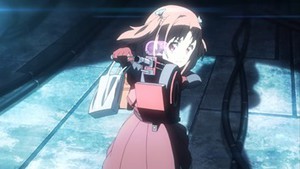
Galilei Donna
Rating: 4.5
Review: The creative muscle behind the noitaminA shows this season is Schwarzeneggerian in proportion. Samurai Flamenco has the tag-team of Baccano! director Takahirio Omori and R.O.D. creator Hideyuki Kurata. This wacked-out sci-fi adventure has one-man band and certified action genius Yasuomi Umetsu manning it—as creator and director, naturally. Unlike Omori, though, Umetsu starts his creation with the pedal mashed all the way to the floor. And he doesn't let up for a minute. The series opens with a violent mecha assault on a methane hydrate plant in Russia. As the plant burns, we cut to Tuscany, where young Hozuki Ferrari is being run down by a relentless drone. Elsewhere in the city her sister Kazuki is being menaced in bed by a knife-wielding sleazebag. Elder sister Hazuki is assaulted by a nasty operative while puking in a public bathroom. Someone is targeting the Ferrari sisters, and neither the police nor the girls’ in-the-process-of-divorce parents know why. Perhaps it has something to do with their ancestor, Renaissance scientist Galileo?
Of course it does. That only makes sense. Later kidnappers mention “Galileo's inheritance,” which adds an element of Dan Brown nuttiness to the already nutty mixture of divorced-family drama, mecha mayhem, and tri-sister moe eccentricity. Clearly Umetsu is exercising the side of his creative personality that was responsible for insanity like Mezzo TV and Kite Liberator. Only this time he seems to be firmly in control. Both in terms of tone—the absurd humor melds weirdly well with the thriller structure—and character. Everyone in the show is colorful to the extreme, but they're fleshed out with a clean efficiency that lends them surprising texture. You find yourself actually looking forward to the Ferraris’ bickering. And Umetsu does all of this while charging relentlessly forward, from one display of flawless craft to the next: the beautifully-constructed, triple-kidnap suspense of the opening; the effortless charm of the Ferrari girls; the vicious tension of a violent home invasion. By the time he arranges a marvel of mecha choreography featuring a lethal mechanical goldfish, well, we're sold.
Galilei Donna is available streaming at Crunchyroll.
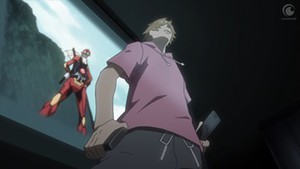 Samurai Flamenco
Samurai Flamenco
Rating: 4
Review: Sometimes all you have to judge a show by is its potential. The inaugural episode of this grown-up superhero oddity doesn't tear the lid off the anime world—indeed it's only a little more than medium entertaining—but it has such enormous potential that there's really no choice but to follow and see where it goes. It may be a while, however, before we can guess where that might be. Right now the show is firmly in introductory mode, taking its time to establish its premise and players. The main ones are Masayoshi and Goto. Goto is a young policeman and a classic nine-to-fiver. No fancy ideals; just punch in, punch out, take your paycheck home. Masayoshi is a model, and he has ideals. His goal in life is to become a superhero, like the masked men in the tokusatsu shows of his youth. Unfortunately, the only qualifications he has are his suit and his toned physique.
The premise is a promising one. It's the kind of premise that can bend itself into comedy, drama, or action. That's not supposition—the same bare bones have been shaped into everything from Kick-Ass to the Dark Knight trilogy. Flamenco shows an early knack for how to steer its premise, deftly turning Masayoshi's sentai obsessions and heroic ineptitude from a joke into something authentically rousing—if still very uncool—in its final scenes. Unfortunately, other than giving us a feel for its characters (who are great by the way; especially complicated Goto), that's all this episode does to give any indication of future quality. It's too busy setting things up to betray how all of the talent stacked behind it—including chameleonic director Takahiro Omori, serial heroism ponderer (and occasional emotional sadist) Hideyuki Kurata, and the action experts at Manglobe—will play out.
Samurai Flamenco is available streaming at Crunchyroll.

My mental choices are completely interfering with my school romantic comedy
Rating: 2.5
Review: If there was ever a poster child for anime's gimmick problem, this is it. The whole show is built around perhaps the dumbest, most unnatural, most thoroughly useless gimmick in current animedom. The gimmick? Like a hero in an eroge, the show's hero—beleaguered Kanade Amakusa—is afflicted with “decision points.” At random junctures a godlike voice in his brain gives him a choice of two actions. He must choose one of them and follow through with it, or his head will explode. The pain is so acute that Kanade will do anything the voice asks of him. He does his best to choose the less awful option, but even the lesser option is usually humiliating, and always very, very public. This has given him an abysmal reputation, but there are those who are weird enough in their own right to befriend him. Strangely, they're all cute girls.
The curious thing about Mental Choices’ gimmick, aside from the fact that Kanade's psychological condition can apparently alter the fabric of reality, is that it's so unnecessary. The show's strengths are unconnected to its central plot device. Actually, make that strength, singular. The series’ only real weapon is its surprisingly solid sense of humor, almost none of which has anything to do with Kanade's illness. The only part of Kanade's affliction that's actually funny are the choices themselves—one is bad, the other is always worse—while the follow-up is usually just irritatingly antic. Kanade's banter with the wackos that hang with him, on the other hand, is right decent (there's a bit with maggot-flavored candy that is hilariously gross), and the montage of historical choices that kicks things off is positively inspired. Even without the fantastical nonsense grafted on, the show may not have survived—the girls are brutally fake moe types and the score is like an awl through your eardrums—but the nonsense doesn't help.
My mental choices are completely interfering with my school romantic comedy is available streaming at Crunchyroll.
 Coppelion Episode 2
Coppelion Episode 2
Rating: 2 ½
Review: We returned for this episode because of Coppelion’s gorgeously desolate metropolitan wilderness—and the secrets that it might hide. But if the only thing that Coppelion is hiding in its decaying skyscrapers are one-off tales of this quality, then we won't be returning for long. Ibara and Aoi rush to Taeko, worrying that the wolf following them might have turned on her. Instead they find Aoi taken hostage by a desperate native. They didn't know there were natives. The man is an escaped prisoner, living with his wife and child in an uncontaminated pocket of a nearby building. The man is wild with worry because his young daughter is missing. After the girls convince him that they're there to help, Ibara and Taeko leave Aoi with his wife—the girl's stepmother—and head out to find the girl. But all is not as it seems, and tragedy in the inevitable consequence.
There are two important things that this episode tells us. One is that Coppelion is content, for now, to stick to standalone rescues. This episode is the kind of self-contained tale that you'd expect from, say, an American broadcast TV series with the same premise. The second is that we were right to worry about the show's emotional potential. The story of the girl and her family has a lot of built-in emotional appeal (who can resist a story about familial bonds in extreme circumstances?), and is fortified by some nice twists, but it's all destroyed by the show's painfully crude emoting. The series doesn't trust us to feel what we're supposed to, so it slaps us in the face with its characters’ emotions. It's insulting, but more importantly, also ineffective. A subtle implication or gentle reminder would have slain us no problem; agonized confessions and endless weeping just pull us out of the moment.
Coppelion is available streaming at Hulu and Viz.com.
 Tokyo Ravens
Tokyo Ravens
Rating: 2.5
Review: When you build a show by eschewing imagination, deliberately choosing only the most weather-beaten of genre building blocks, you reduce the variables in your creation to one: execution. If this is the route you plan to take—and it is a perfectly viable route—then you better make damned sure that your execution is dead on. Tokyo Ravens’ execution is about half-right, which means that it's far from a painful experience, but is also equally far from pleasurable.
Our building blocks this time are of the magical-action variety, with a little harem-flavored romantic drama tossed in for good measure. Harutora Tsuchimikado, an apparently normal boy from a long line of powerful onmyou sorcerers, is the center of the story. Long ago he promised the future head of his clan that he'd be her familiar when they grew up. Unfortunately he grew up completely spirit-blind and eventually gave up on his dream. Now he spends his time hanging with friends (one of whom is smitten) in his country hometown. Until the head of his clan returns.
The show is exactly as crushingly clichéd as that makes it sound. Watching Tokyo Ravens is probably the closest you'll get to experiencing precognition. In a show that gets the desired effect from its tropes, that wouldn't be a problem. But Ravens only does its tropes half-right. So when the inevitable heartbreak comes visiting Harutora's sunny, smitten friend Hokuto, the show nails the visuals—lingering on the ironic flowering of fireworks around her as she witnesses something she really doesn't want to—but rushes the buildup and opts for the wrong trigger. The result: a lovely scene with none of the emotional impact that it aims for. And that's more or less the story for the whole show. It half-asses everything just enough that nothing has the right effect—not action, not intrigue, not romance, not even the scary, food-molesting psycho-Barbie who shows up at the end. In a show whose very move is predetermined, that's lethal.
Tokyo Ravens is available streaming at Funimation.com.
 BlazBlue Alter Memory
BlazBlue Alter Memory
Rating: 1.5
Review: Wanna Be the Strongest in the World is more despicable, Walkure Romanze is more pointless, but for sheer tonnage of raw badness, BlazBlue is king. From the opening to the end, from the acting to the action, everything in this show is awful. Even the names. Ragna the Bloodedge? That's something you'd expect to find in some horrible, self-consciously cool video game. Oh, right; that's exactly what BlazBlue originally was. In the next-episode preview, Ragna recites a charm to ward off the curse that afflicts TV shows based on action games. It clearly didn't work. Or maybe this whole episode is actually part of a giant meta-fictional joke. We claw at our brains as the episode torments us with every evil brand of badness it can devise, and then Ragna recites that charm and next week the show's creators transform it into a robust paragon of action anime. Ha, ha! we laugh, suitably impressed by their cleverness. You should have seen your faces, the staff says, and everyone holds hands and skips into the sunset.
Seriously, that's the only way this ends well. For those who actually want to know what this heap of flaming dung is about, here's a brief rundown. Ragna is wanted badass with a big bounty, a bigger sword, and two -toned eyes that glare manfully at all of the people he shouts at. He's tortured by a past trauma involving a girl, a boy, and lots of blood and fire. He's caught up in some neverending cycle of violence and rebirth that this time has him wandering around destroying government buildings. He accidentally befriends a beast-girl bounty hunter, has a showdown with a madman from his past, meets an innocent girl who looks exactly like the girl in his flashback, and… Do I really need to keep going? The plot is a jagged mess, every member of the cast is a festering boil on our asses, and there's a vampire girl named Alucard (Dracula spelled backwards, my friend) who speaks only in portentous nonsense. Had enough? Me too.
BlazBlue Alter Memory is available streaming at Funimation.com.
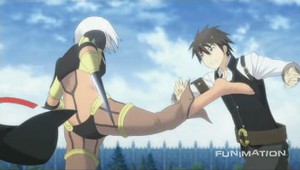
Unbreakable Machine Doll
Rating: 3
Review: Director Kinji Yoshimoto deserves to burn in hell just a little bit less after this episode has finished. Of course he's still going to fry; if not for this season's abominable I couldn't become a hero… then definitely for sabotaging Genshiken 2—a sin for which there is no forgiveness. But Unbreakable Machine Doll at least gets him a step or two closer to the nicer suburbs of Gehenna.
Doll is a straightforward type of magical action show, with the usual idiosyncratic setting and a familiar fondness for early 20th century Europe. It imagines turn-of-the-century London as the center for a powerful new military technology: machine dolls. The dolls are weaponized puppets controlled by specialized magicians. They can be enormously powerful, especially if their master is a skilled magic-user. Raishin Akabane is a Japanese puppeteer on his way to England's Walpurgis Royal Academy, where students train to become masters of Machinart. Accompanied by his devoted doll Yaya, he's on a mission of revenge that can only be completed if he enrolls and gains entry to a special machine doll tournament.
Yoshimoto proves surprisingly competent at action, putting together a gratuitous but spectacular runaway train rescue (baldly designed to demonstrate Yaya's strength) and a doll free-for all in which Raishin deals out some slick violence of his own. Of course, Yoshimoto gets a lot of help from the unexpectedly idiosyncratic CG of Lerche, and from Doll itself. Specifically from Yaya, who mixes adorable sexiness and action-hero cool with aplomb, and from Raishin, who adds a reasonable measure of intensity, especially in the episode's last scene. There're a lot of good reasons to be worried about Doll, not least of which is Yoshimoto himself, not to mention the oncoming tournament and the harem twinkle you can already see in its eye. For now, though, it's pretty solid entertainment.
Unbreakable Machine Doll is available streaming at Funimation.com.

Arpeggio of Blue Steel
Rating: 2
Review: Seiji Kishi, a director whose success rate is roughly 20%, delivers another blow to his stats with this visually impressive but narratively deceased military adventure. In it humanity faces its most indomitable foe ever: Day-Glo battleships. Eek! The ships show up in 2039, after human activities have raised the sea levels and substantially reduced the dry land available to mankind. At this crucial time, a fleet of glowy alien ships—fashioned after classic vessels of the Second World War—appear out of nowhere and definitively crush humanity's military. Mankind finds itself splintered, unable to use the ocean, unable to communicate across long distances, isolated in discrete pockets across the world. Flash forward some years. Top naval cadet Gunzou Chihaya is brooding at the naval academy. On a field trip he touches a captured alien vessel. It glows and then later a mysterious girl visits him. She's the personification of the ship he touched, which has been ordered to follow his every command.
Thrilling naval warfare is nice, anthropomorphized ships are, well, kinda creepy, and the ecological message, though wan and widely neglected, is welcome, but in delivering all of that, Arpeggio of Blue Steel forgets one small but important thing: A reason to keep watching. The closest it gets is when serving up flashy naval destruction…and that's really not that close. The show quickly takes shape as one of those “rogue team” serials, with Gunzou leading his crackerjack team of teen misfits on what promises to be a dispiritingly uninteresting series of mercenary missions. The mystery of the Fog Fleet—as the aliens are known—is dully cliché and the machinations of the humans are equally mundane. Gunzou himself has the personality of a gloomy rock, his crew is stocked with bad stereotypes, and his relationship with Iona, the winsome avatar of his alien submersible, is simultaneously boring and unpleasantly exploitative. There is no personal, emotional, or intellectual handle with which to grab onto the series. The only choice is to let go and let it sail off to… wherever. It's not like we care.
Arpeggio of Blue Steel is available streaming at Crunchyroll.

Non Non Biyori
Rating: 3.5
Review: Comedies about idling schoolgirls are the cockroaches of anime—brilliantly simple pests superbly adapted to thrive and reproduce in their chosen environment—but this is one you won't want to squash. Biyori is schoolgirl comedy the way it should always be: innocent, soothing, and most of all, genuinely funny. Biyori’s gimmick—and there's always a gimmick—is that its four friends live in the far boondocks, where there are so few children that they all share the same classroom, despite being from vastly different grades. Ren is a precociously odd first grader. Responsible Komari is in eighth grade. Her outgoing sister Natsumi is a grade below her, and introverted Tokyo transplant Hotaru, just transferred from the big city, is in fifth. There's also a guy in their class, but no one cares about him. Together they do… stuff.
If there's a plot this episode, it has to do with Ren trying to welcome Hotaru to their, um, town. Which adds a touch of sweetness but not much structure. Biyori isn't good because it's more substantial or even noticeably different than your average comedy about nothing, but because it does what the genre asks of it and does it right. It has an easygoing rhythm that matches its backwater setting well, and a wonderfully deadpan sense of humor that doesn't get in the way of its occasional lyrical interludes. Despite its comedy categorization, the show has a deep and slow appreciation for the peace and beauty of the countryside, taking its time to appreciate the way light slants through forest trees or edible herbs sprout from the roadside. It basks in the warmth of the girls’ friendship without worrying about the next punchline, and without letting their rapport thicken into syrupy sweetness or crystalize into moe eccentricity. In the meantime it somehow racks up an impressive comedic score, ranging from its knowing dismissal of the show's sole boy to a tanuki gag that slays with po-faced precision. A treat, truly.
Non Non Biyori is available streaming at Crunchyroll.
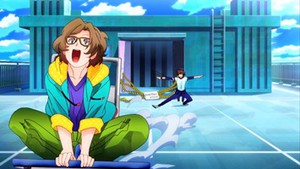
Meganebu!
Rating: 2.5
Review: Independent animator Soubi Yamamoto's television debut is a good-natured but eminently disposable bit of shonen-ai-flavored schoolyard fluff. Meganebu gives Yamamoto a sweetly harmless platform for her stylish direction, but precious little else. “Meganebu” means “glasses club,” and that's exactly what Akira Souma—our main character—runs. A cheerfully eccentric teen inventor, Akira has roped all his glasses-wearing classmates into his club, the purpose of which is apparently to build a working pair of X-ray glasses. Unfortunately, none of them are terribly bright, so their invention tends to explode. They're on their 34th incarnation of the specs, and are already down one charred clubroom. Reduced to assembling their delicate project on the windy school roof, the club's five members rush to finish their latest version before the school's vision test ends and, more importantly, the (theoretical) nurse who administers it leaves.
Yamamoto's direction is impressively inventive—she stages one sequence as a beautifully-composed pan down a never-ending manga page, and uses stylized settings and strange transitions in a way that recalls the more humorous excesses of Akiyuki Shinbo—but no matter how much style she throws at it, she can't get around the fact that Meganebu is essentially an all-boys version of those girly clubroom comedies that proliferated in the wake of K-on!. As such it's happy and energetically silly but ultimately empty and forgettable. The only interesting thing it does is offer male fans a taste of what it must be like to be a female fan watching one of those K-on! clones. The occasional good chuckle (such as the recurring abuse of the club's “provisional” member) doesn't change that. For female fans willing to forgive its sugary hollowness, Meganebu does offer up plenty of luscious male designs and mildly amorous friendships, but afterwards you'll want to dig into something more substantial. Like maybe a Twinkie.
Meganebu! is available streaming at Crunchyroll.
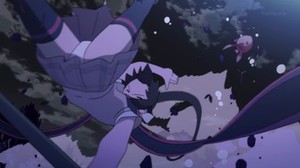
Yozakura Quartet ~Hana no Uta~
Rating: 3.5
Review: Not a sequel to Kou Matsuo and Nomad's 2008 yawner but rather a full-on remake, this appealingly slick agglomeration of easygoing character silliness and truly weird supernatural fighting is overstuffed and under-explained, but presented with such verve that you don't really mind. The essentials are the same as before: the place is Sakurashin, a town dominated by giant magical pillars where youkai—demons and beasts from Japanese folklore—live peacefully with humans. The heroes are four youths, sworn to protect Sakurashin from whatever might threaten that peace. Gluttonous, well-liked Hime is the town's mayor and a scary fighter. Carefree Ao is a catgirl who can read minds. Fierce Kotoha is a half-demon who can turn words into physical objects. Akina is just some guy. In this episode they help a lost girl and protect the town festival from giant goldfish.
The show isn't quite as silly as that last comment makes it seem. True, the goldfish aren't much of a threat, but they stem from a mysterious cat-man who clearly is, who is himself working—uncomfortably it would seem—with a shape-shifting witch whose gleeful premonition of anarchy is a lot scarier than his shadowy scheming. Plot complications are surely in the offing. But not for now. For now, the show is all about the world, the characters, and the fleet-footed fun. Emphasis on the latter. Director Ryo-timo clearly understands the appeal of Suzuhito Yasuda's original manga better than Matsuo did. He fills the episode with wonderfully-animated cuteness (Ao is a sugar high unto herself, and Hime's gluttony is among anime's most adorable) and his action is beautifully fluid and very funny. The episode cruises easily by, fueled by eye-candy capers and swathed in lovely atmosphere. Ryo-timo does throw the entire cast—every bit player of it—at us during the episode, jamming the proceedings with a confusing parade of cameos, but it's a small enough price to pay.

Yowamushi Pedal
Rating: 3 ½
Review: Bicycling isn't a common sport for anime to address, which is a shame since it lends itself well to the intensity of competition that is the lifeblood of sports anime. If it wasn't intense and competitive, would Lance Armstrong have needed to dope himself to gills to win? No. Ironically, though, the thing that makes Yowapeda’s first episode great has nothing to do with intensity or competition. Instead, it has everything to do with its extremely odd choice in athletes. Though calling Sakamichi Onoda an athlete is something of a stretch. What he really is is a devoted otaku. Upon entering high school he wants nothing more than to join the anime club and make anime friends. He has no idea that he's a frightening natural athlete, as demonstrated by his 45 km bike trips to Akiba (trains cost money—money better spent gambling on collectibles) and ability to sing anime songs while cruising up hills that leave expert cyclists gasping.
His gifts don't escape the attention of others though, including cute cycling club manager Miki and obsessive new club recruit Shunsuke Imaizumi. It's from the latter that we get some sense for the series’ sports-action potential. He's a serious and focused boy, and the episode builds to the inevitable race between him and Onoda with good humor and sly tension. You don't even notice the tension building until Shunsuke challenges Onoda and you realize how very much you want to see them race. (Especially if it's on the “mommy” bikes that Onoda prefers, as it would have to be to be fair.) Onoda for his part spends the episode being hilariously awkward and just generally hugely charming. His good cheer and anime-fueled energy are infectious and his social ineptitude weirdly winning. A vivid supporting cast and lively direction from Osamu Nabeshima round out the show's strengths, while its only real weakness, Shunsuke, proves himself to be no weakness at all (wait for the after-credits sequence; it's worth it). Kind of silly, but loads of fun.
Yowamushi Pedal is available streaming at Crunchyroll.
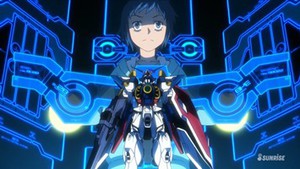
Gundam Build Fighters
Rating: 2 ½
Review: When the Gundam franchise pitches shows at a younger audience, it tends not to do well. Think of SD Gundam and Gundam Age. So the idea of a tournament-gaming Gundam show—imagine Gundam by way of Yu-Gi-Oh—is not something to inspire confidence. And the lack of confidence is justified. Build Fighters is a merchandising opportunity disguised as a TV show. That said, for a merchandising opportunity, it works reasonably well as simple entertainment (emphasis on the simple).
The premise is about what you'd expect. In the near future, a platform is invented that allows players to “pilot” Gunpla (the popular plastic Gundam models) in virtual environments. Think of it as a miniature Holodeck with remote-control capabilities. This allows players to realistically enact Gundam-universe battles with their toys. It also allows them to fight Gunpla tournaments. Which naturally become a worldwide sensation. Sei is the son of a previous Gunpla champion. He's an expert at building Gundams, but pretty awful at piloting them. Still, he wants to enter the tournament. For that, he'll need someone to pilot his beautifully crafted models. Enter Reiji, an exceedingly mysterious boy who Sei helps out of a jam. Reiji is a natural Gunpla pilot, but will he join Sei?
Build Fighters has good fundamentals. Its production values are top-notch, putting the full weight of Sunrise's decades of Gundam experience behind its plastic-model rumbles. Sei is a good hero—determined yet aware of his limitations, sensitive but with the right touch of goofy awkwardness—and it hurts nothing that Sei's mom is smoking hot (which is a phrase I never thought I'd say). But none of that can erase the embarrassingly obvious marketing, nor the basic fact that the show's intense battles are being fought by goddamned models. Reiji—who the show strongly implies is an alien—is also kind of annoying, which makes the inevitable extended tournament an even more dispiriting prospect.
Gundam Build Fighters is available streaming at Gundam.info.
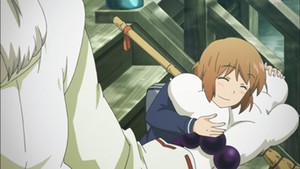 Gingitsune
Gingitsune
Rating: 3
Review: Different shows fulfill different roles. Sometimes you need your heart crushed with fifty-pound melodrama hammer. Sometimes you need to laugh so hard that you forget who you are. And sometimes you just need something to carve out a quiet, peaceful space to unwind. No stress. No surprises. Nothing to think about or fret over. For that particular need, I'm putting my money on Gingitsune this season. Gingitsune is an account of the everyday life of Makoto Saeki, the only daughter of the priest and priestess of a small Shinto shrine. When Makoto's mother died, Makoto was only four, but she inherited her mother's place at the shrine anyway. As the sole legitimate heir—her father married into the family and is thus disqualified—Makoto becomes the only person who can see and interact with the shrine's herald: a gruff fox deity named Gintaro, who serves as the shrine's conduit to the gods.
This episode deals with a spat between the now-teenaged Makoto and Gintaro. What it's about doesn't really matter, though it bears mentioning that it involves a prickly classmate who may become a valued friend. The whole thing is gentle and mild to a fault, unfolding without an ounce of hurry and spiced with just enough bittersweet feeling to justify its existence. The series’ relationships are stable and comfortable, even when under stress, and there are no bad guys or good guys. Particularly warming are Makoto's relationships with her understanding father and with brusque, secretly soft-hearted Gintaro. (Gintaro, for the record, is not a sexy human-styled fox god; he's a burly, hairy, fox-faced fox god).There may be some drama brewing at Makoto's school, but it will almost definitely be confined to empathetic one-offs like this one. Like many a well-crafted slab of relaxation, the show has no drive, but it doesn't really need any. After all, we don't want to move; we want to lie still and bask in the peace and quiet.
Gingitsune is available streaming at Crunchyroll.

Walkure Romanze
Rating: 1 ½
Review: One thing you can say about anime, it helps you exercise your negative hyperboles. If I have to watch one more pornless porn-game adaptation in which some personality-lobotomized lump of man-flesh has to decide which curvaceous cardboard cutout to partner with for some far-fetched activity, I swear I'll stick an icepick in my eye and liquefy my frontal lobes. No… That's no good. Too much like the Taser comment in the Log Horizon preview. Plus… Two lobotomy references in one sentence? That won't do. Let's see… Perhaps something about the creative use of 2x4s on the person who thought jousting would be more appealing if it was a girls’ sport with mandatory buttless armor? No. Too mundane. Something about how the robotic formula makes HAL 9000 seem reasonable and flexible? Amusingly geeky, but kinda formulaic in its own right. Maybe more specific is the way to go. A comment about the horse that keeps chewing the skirts off of girls’ rears? What could we possibly say about that that's worse than the mere fact that there's a girl-molesting horse in the show? Maybe a jab at the technical merits would be more productive. A mention, say, of how the score makes you want to feed a minstrel to cannibals. Unfortunately that line of criticism won't take us far. The girls are too pretty to slime, and the CG knights are kind of embarrassingly cool. So… characters? Most of the girls are too thinly written to say anything about, even anything mean. And the main character is like a man-shaped Monopoly piece that the writers move around. There is the aggressively cute main heroine... Watching her is like being punched in the eye with a fuzzy bunny. Ooh. I kind of like that one.
Walkure Romanze is available streaming at Crunchyroll.

Outbreak Company
Rating: 3
Review: Surprisingly thoughtful treatment of a fun premise manages to elevate this alternate-world comedy above its fundamental foundation of fantasy clichés, but a good premise will only get you so far. The show's going to have to put together something plotlike in the near future, otherwise its stranger-in-a-strange-land shtick is going to wear thin very quickly. The stranger in this case is hardcore otaku Shinichi Kanou, who answers a questionable want ad and finds himself drugged and spirited off to an RPG-like fantasy world. He learns that Japan has recently come into contact—via a convenient inter-dimensional rift—with an honest-to-god sword-and-sorcery empire. The government wants to foster friendly relations, and has decided that cultural exchange is the way to go. Initial data suggests that the Eldant Empire's citizens respond well to anime, but unfortunately the government is lousy at entertainment promotion. Enter Shinichi. Who better to promote otaku culture, after all, than an irredeemable otaku shut-in?
Outbreak has a lot of fun with Shinichi's otakufied reactions—his enthusiasm freaks the hell out pretty much every native he meets, beginning with his unfortunate maid Myusel—and gets good mileage out of the incongruous realism of the government's operation (it's run just like any normal embassy, if you ignore the whole kidnapping angle) as well as the unflappable calm of Shinichi's busty military escort Minori. But overall the show isn't as funny as its premise would suggest. In part that's because the show hasn't the inventiveness of a truly funny comedy; in part that's because of its nudge-nudge wink-wink otaku pandering; and in part it's simply because the show isn't always trying to be funny. The latter hints that the series might have semi-serious ambitions—as does Musel's quivering low-caste subservience and the general level of thought put into the show's portrayal of contact across dimensions—but until those ambitions make themselves known, this will remain a merely amusing diversion.
Outbreak Company is available streaming at Crunchyroll.
 Wanna Be the Strongest in the World
Wanna Be the Strongest in the World
Rating: 1
Review: Any time a show starts with a girl squealing erotically in pain, your best option is to flee. Unfortunately reviewers don't have that option. So the next best thing is to verbally abuse the show in hopes that it will flee. Yes, it's futile, but at least it makes me feel better. For the record, the set-up goes something like this: Sakura Hagiwara is a top-flight idol, the fan-favorite leader of the chart-topping idol group Sweet Diva. She loves her job and her bandmates, and always strives to do the very best at whatever is asked of her. She's exceedingly stubborn where her job and the honor of the idol-singing profession are concerned. One day she goes to a promotional training event at a well-known pro-wrestling gym. While there, female wrestler Rio beats up on Sakura's bandmate Elen and insults the idol profession. Sakura gets angry and challenges Rio to a match. After a grueling defeat, Sakura decides to take up wrestling and get her revenge.
This is an unpleasant, exploitative, and screamingly hypocritical show. There are plenty of speeches about how women's wrestling (and idol-singing) deserve respect, and yet the show treats the sport with the leering misogyny, lingering lovingly on its vagina-level shots of girls in tights wrenching each other's limbs out of socket and glorying in Sakura's hentai-ready squeals of pain/pleasure. It's fighting of a surprisingly nasty sort: vicious, interminable, and sexualized in a distinctly ugly way. The series has pretty decent sports-anime fundamentals—Sakura is likeable and determined, her foe is cruel yet somewhat justified, and the wrestling moves are well-executed—but that somehow only makes it worse. That Sakura and her fights draw you in means that you're just that much closer when director Rion Kujo decides to make women's wrestling a thinly-disguised stand-in for sexual humiliation.
Wanna Be the Strongest in the World is available streaming at Crunchyroll.
 Magi: The Kingdom of Magic
Magi: The Kingdom of Magic
Rating: 4
Review: Magi is not the most consistent show. Season one had all manner of ups and downs, bumping through clunky one-offs, uninvolving side-stories, and video-game dungeon crawls before buckling down for intense extended arcs full of darkly intriguing world-building details. On a whole the season ended more up than down, but that was no guarantee that season two would begin in the same position. The short of it? It does. Indeed it takes up exactly where season one left off: With Aladdin, Alibaba, and Morgiana just back from capturing the dungeon of Zagan, and the nation of Sindria celebrating its victory over the evil organization Al-Thamen. The celebratory mood is brief however. Alibaba and Aladdin's new comrade Hakuryu is set to depart Sindria, Morgiana is still upset at her perceived weakness, and Aladdin's friendship with the recently rescued Princess Dunya takes a turn for the tragic when her ordeal with the Dark Metal Vessel starts taking a lethal toll on her body.
And there's more. Lots more. The episode works hard to kick-start almost everyone's personal arcs. Sinbad decides to make use of enemy princess Kougyoku's mega-sized Sinbad-crush to advance his cause. Alibaba starts to wonder about where to go next, and Aladdin is clearly considering a journey to the dangerous Magnostadt Academy to study magic. Interesting personal complications start cropping up—Morgiana witnesses Alibaba sharing a moment with Kougyoku and later has a moment of her own with Hakuryu—as the series positions its protagonists to go rocketing off on their own individual adventures. The series’ Arabian Nights flavor continues to be alluring—its world is growing nicely—and the opening flash-forward gives a thrilling taste of what's in store…as well as a glimpse of the kind of spectacle that director Koji Masunari is capable of. There will of course be missteps going forward, but it should be a great journey nonetheless.
Magi: The Kingdom of Magic is available streaming at Crunchyroll.
 Ace of Diamond
Ace of Diamond
Rating: 3
Review: Maybe we've been spoiled by the incomparable baseball tales of Mitsuru Adachi, but something about this (very) shonen take on the sport feels distastefully broad. A hell of a main character and lots of potentially interesting conflict—both of the sporting and the dramatic variety—balance that out, but it still dampens the show's enjoyment factor. Eijun Sawamura is the fiery pitcher for a happy but low-performing baseball club. His school is about to be demolished and he and his teammates are about to graduate, so he wants the team to make its mark on the middle-school scene. Unfortunately they're soundly defeated, and when the opposing team mocks Eijun's team, he beats the crap out of them. Eijun wants to continue with his current mates, but the assistant team director from Seidou, a prestigious baseball school, sees that last game and decides to scout him. Eijun is determined to stay his course, but he starts to waver when he visits Seidou.
Eijun is the kind of character who pulls a series behind him, and that's good because when he pulls he usually cracks the show's serious mood wide open. His outbursts are very funny and often unpredictable, adding some much-needed spice to the series’ generally hackneyed proceedings. The humor is as broad as anything else in the show, but broad humor can get by where broad drama can't. And the show's drama tends to be pretty broad: lots of streaming tears, black-faced anger, and too-happy affirmations of team bonds, exacerbated by less-than-subtle character animation and a cast that's heavy on extreme personalities. The episode's main antagonist is the kind of bullying straw-man that kids’ shows have used as bad guys since the dawn of kids’ shows. That the episode does its job (convincing us to follow it into episode two) is all because of Eijun, and the tricky decision he's facing: let his career rot in the boondocks, or abandon his comrades for a glitzy big-city team. Oh yeah, Rei—Seidou's scary, calculating, and thoroughly awesome lady director—also helps.
Ace of Diamond is available streaming at Crunchyroll.
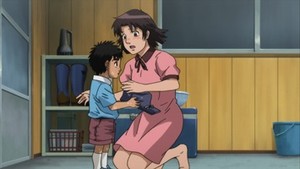
Hajime no Ippo Rising
Rating: 3.5
Review: There's a wealth of sports anime this season, and it's far too soon to say which will end up on top, but this latest entry in the saga of mild-mannered boxer Ippo Makunouchi is certainly a contender. And that's a problem. Because by all rights it should be the prohibitive favorite. For seventy-six episodes, a TV movie, and an OVA, Hajime no Ippo was one of the sports-anime greats. But when it made a belated return in 2009, something was missing. It just wasn't the entertaining juggernaut that it once was. As far as can be determined from a single episode, that feeling continues here.
The reason? Well, it's not the writing. This episode begins with a look back at Ippo's childhood that is just heartbreaking, exploring the place Ippo's father had in his boy's life and the hole it left—both in Ippo's life and his mother's—when he went to sea and never came back. The challenger the episode lines up for Ippo, who is still Japan's defending featherweight champ, has clearly delineated goals and motivations, and naturally presents a unique set of challenges for the champ to deal with. Most of what makes an episode of Ippo come out swinging is present and accounted for, including the great supporting cast.
No, the problem comes from the flip side of the creative coin: execution. It has everything to with the exit of the show's first director, Satoshi Nishimura. The sequels lose his deft blending of action, humor, and life drama—the elements separate out, falling out of balance and ending up kind of crude and overdone. They lose his ear for the interplay of music and visuals, sound effects and editing. They lose his eye for movement and anal attention to musculature and articulation. They lose his pinpoint timing and instinct for building tension. The result can be subtle—the show still thrills when it needs to—but it's damaging, especially to the action. Just check out the chasm between the first fight in the opening montage and the ones that follow.
Hajime no Ippo Rising is available streaming at Crunchyroll.
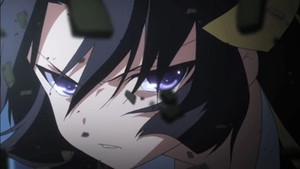
Little Busters! Refrain
Rating: 3
Review: Little Busters’ first season left a lot of loose ends untied. It also failed to give several major players super-sad backstories. Refrain is here to rectify all that. Or at least the super-sad part. The sequel speeds past the wacky silliness of the first season's opening episodes, getting right to the melancholy foreshadowing and heavy-duty emoting. Which is overall a good thing. As anyone who sits through the painfully forced cheerfulness of this episode's opening half will know, humorous frolicking is not what Little Busters does best. Though for some reason it insists on trying. The frolicking in this case involves Rin, Komari, and Kudryavka throwing a pancake party in celebration of the Little Busters’ first baseball game. It is far and away the worst part of this episode: phony, unfunny, borderline unwatchable. It's also blessedly short-lived. The remainder of the episode focuses on frosty perfect-girl Yuiko, who has warmed considerably under the influence of her teammates. That happiness pisses off her enemies, who launch an attack of pettily cliché bullying in an attempt to separate Yuiko from the Busters. Yuiko is not pleased.
No, she is not. The scene where she confronts the bullies, directing a terrifying rage at them, is definitely the episode's highlight. It's exactly the kind of intense, high-emotion sequence that Key series do well. Which is something the show should take note of. So long as Refrain focuses on the popular game-makers’ strengths—slow-building emotional tension, hard-hitting melodrama, that floating aura of supernatural dislocation and impending emotional doom—this episode manages a pretty good semblance of the sweetly sad power that marked Key's earlier successes. Unfortunately it also comes with Key's usual drawbacks; namely a repetitive guy-helps-girl structure (apparently it's Yuko's turn this time) and a cloyingly moe female cast. And as with season one, there's no Tatsuya Ishihara or Kyoto Animation—Key's Kanon and Clannad collaborators—on board to supply the sheer animation talent to make either one work. Oh yes, and Riki is still an uninteresting lump.
Little Busters! Refrain is available streaming at Crunchyroll.

Log Horizon
Rating: 2.5
Review: The execution is fine, and the tone right, but the premise… On the day that the new expansion pack for his favorite MMORPG is set to go into effect, Shiroe wakes up to find himself somehow transported to the game's world. Along with several hundred thousand players worldwide, Shiroe has somehow become his Elder World character. After some experimenting with controls, he contacts a couple of his old comrades: Naotsugu, a cheerful warrior type, and Akatsuki, a lone assassin who asks Shiroe for his appearance-changing potion because her character is a guy and she wants to return to being a girl. The three go out to take on some low-level beasties—the better to figure out how this new reality works and get their “game legs.” In the meantime their fellow gamers are adjusting too. A guildmaster friend of Shiroe's tries to recruit him—her guild isn't strong and she's clearly worried—while other players fall into despair or bad behavior.
The proliferation of game-turned-real shows may have been inevitable given the success of Sword Art Online, but it still makes you want to stick a Taser in your brain and pull the trigger. There's nothing particularly interesting about the premise, especially if you aren't the gaming type, and even if you are, something about the genre's desire to give you a world where your pastime really can become your whole life is unutterably depressing. If you can get past that though—or it isn't an issue—then you can do worse than Log Horizon. Director Shinji Ishihara and studio Satelight have enough action experience to pull off the beastie-battles, and they create a reasonably attractive post-apocalyptic world. The series doesn't take itself too seriously, but it isn't devoid of feeling or consequences either. That Shiroe is a strategist instead of a kickass warrior is welcome, and it hurts nothing that Akatsuki is murderously cute. The end of the episode shepherds the next in quite nicely, and overall the series seems to be a decent middle-of-the-road fantasy package.
Log Horizon is available streaming at Crunchyroll.
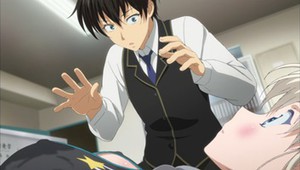
I couldn't become a hero, so I reluctantly decided to get a job.
Rating: 2
Review: With a title like that, why bother with synopses anymore? Just add a few sound effects and you know everything worth knowing about the show: “I couldn't become a hero, so I reluctantly decided to get a job. Jiggle, jiggle, snort.” Voila. Summation complete. I couldn't… is a series with a promising comedic concept—summed up in its title—and an inexplicable need to bolster it with swinging boobs, upskirt cameras, and unfunny fan-service situations. The titular hero is Raul, who trained long and hard with his clichéd team of RPG cohorts to become a demon-fighting hero, only to have the rug pulled from beneath him by the untimely defeat of the Demon King. Thus he finds himself working as a salesman at a magical appliance store. For some reason all the other workers are women with little awareness of where their skirts end and a fondness for chest-stressing vertical movement. Raul's boring routine is disrupted when he's asked to train their newest recruit, Fino, who happens to be the Demon King's daughter.
And thus begins Raul's great… Oh Hell, who are we fooling. The only thing that begins is a pointless, meandering fan-service comedy. Raul tries to sell stuff while his lady manager and carefree co-worker jiggle and flash their panties. He eats lunch as the girl from the convenience store talks to him and moves in ways that really shouldn't make her chest move as pneumatically as it does. When Fino shows up, a well-placed squirt of water gets her concealing hoodie off, and in no time she's wearing a miniskirt and soaping up her boobs. There are a few okay jokes sprinkled across the episode—Fino's stubbornly evil customer-service banter is pretty good—but not nearly as many as there should be given the comedic possibilities of a former hero and a Demon Princess working retail together. The show could learn a thing or two from The Devil is a Part-Timer; especially director Kinji Yoshimoto, who continues to prove dispiritingly tone-deaf and undisciplined.
I couldn't become a hero, so I reluctantly decided to get a job. is available streaming at Crunchyroll.
 Strike the Blood
Strike the Blood
Rating: 3
Review: If I beg enough, will someone close whatever spigot it is that keeps pouring vampires into my life? Perhaps if I throw the right virgin into a volcano or give a mad scientist enough time-travel money, someone can hop back to the Victorian age and push Bram Stoker into the ocean. Given that personal level of antipathy, it's a little embarrassing to find myself enjoying this agreeably workmanlike take on vampires (and other supernatural anime action tropes), but it is enjoyable—in its own mediocre kind of way. Since there must be a reluctant vampire hero, ours is Kojou Akatsuki. Three months ago he was a normal high-school student, but during an event of which he has little memory he was turned not only into a vampire, but an exceptionally powerful one, known to the forces that would use or destroy him as the Fourth Progenitor. Akatsuki wants to live normally, a goal that gets a visible step further away when Yukina Himeragi, a cute investigator from a mysterious organization, enters his life.
This all terribly standard stuff. Akatsuki fights his vampire instincts and tries to blend in. He demonstrates his reluctance to use his powers as rumors swirl about him and the series awkwardly constructs its supernatural mythology. Yawn. The show tosses in some goofy-sounding secret organizations, dredges up Akatsuki and Yukina's initial meeting from the reeking depths of the ecchi rom-com swamp, and just generally does nothing that doesn't have the smudgy, worked-over feel of fourth-generation photocopy. And yet somehow it hits just enough of the right notes that it's never quite the moldy waste of life that it should be. Akatsuki is likeably laid-back. Yukina isn't monster bait. Their town is blithely used to monsters (it's a wildlife refuge of sorts). There are proper hints of hidden drama (Akatsuki's past) and innocent romance (the obvious), and even a reasonable sense of humor (when aroused, Akatsuki calms his bloodlust by drinking his own nosebleeds). Give it a couple episodes; it's earned that much at least.
Strike the Blood is available streaming at Crunchyroll.

Nagi no Asukara
Rating: 3.5
Review: P.A. Works’ latest original is a lovely little school romance with a gorgeous setting and a bit of a problem with its male lead, Hikari. Namely, he's kind of a dick. Especially to timid, sensitive Manaka, the girl he's clearly in love with. The two have been friends forever, with brash, abrasive Hikari serving as shy Manaka's protector in the underwater city where they live. (The city's inhabitants are the water-breathing descendants of a sea god.) He's genuinely convinced that Manaka can't do a thing on her own, and berates and pushes her around like a bullying elder sibling. He's particularly on edge now because their underwater school has been closed and they and their friends Chisaki and Kaname will now have to attend classes on land. The situation only gets worse when Manaka is scooped up in a fish net (after Hikari abandons her on their way to school) and meets Tsumugu, a land-dwelling boy with whom she shares an immediate attraction.
Naturally Hikari goes nuts with jealousy, which makes his behavior worse but curiously makes him easier to like. It becomes increasingly clear that Hikari is just an awkward kid who doesn't know how to deal with his burgeoning romantic feelings, covering up his tenderness and embarrassment with invective and hiding his need for Manaka behind a self-reinforced belief that she needs him. That helps soften him considerably, making it much easier to freely enjoy the series’ quiet vein of bittersweet emotion. The dynamic between Hikari, Manaka, and Tsumugu is further complicated by the series’ setting. The series uses its fantastical premise—in which sea and land peoples must try to coexist—to explore some surprisingly relevant ideas, from racism and immigration to the thorny relations between the powerful and the powerless. All that, and it's beautiful to boot—the series’ underwater scenes are like surreal poetry. If Asukara does right by Manaka—she needs to take the reins of her own life, which will naturally upend Hikari's—then it has a promising future ahead of it.
Nagi no Asukara is available streaming at Crunchyroll.
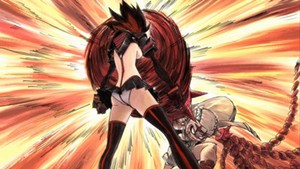
Kill La Kill
Rating: 4
Review: Hiroyuki Imaishi and his Gurren Lagann collaborators are hoping that lightning really can strike twice—if you replicate the circumstances correctly. And damned if they aren't right. If you're going to try and replicate past successes, this is the way to do it: by preserving the unhinged spirit of the original but heading in your own uniquely bonkers direction. Honnouji Academy: imposing, terrifying; a school ruled by fear, where superpowered uniforms give a select few the strength to cow the powerless masses. Those few are led by Satsuki Kiryuuin, the school's icy, cutthroat student council president. She's so powerful that she's basically a feudal lord, but that doesn't matter to hot-blooded transfer student Ryuuko Matoi. Ryuuko has reason to think that the President was involved in her father's death. So she attacks her with one half of the giant pair of scissors that were used to assassinate him. Which doesn't go over well with her vicious underlings.
You can think of Kill La Kill as Imaishi and co.’s attempt to do for school combat what they did for giant robots. The intent—to explode the genre by jacking it up to mind-boggling extremes—is the same, as is the A-bomb energy and rabid ferocity with which they attack their chosen genre's signature tropes. The hop in genre does mean, however, that the two series have their own distinct brands of insanity. Kill La Kill is pure action: hyperkinetic schoolyard battling given a million-volt kick in the ass; shonen fighting on a cartoon acid trip. The scraps of world-building are almost an afterthought—informative tidbits accidentally dropped between surprisingly nasty bouts of wacko violence—the characters are pared down to their crazy-eyed too-cool bones, and the story has the stripped-down momentum of an exploitation revenge pic… with sentient miniskirts and evil boxing munchkins of course. In short: fantastic. It's hard to know if the show will have the narrative audacity to match its mad style, but it should be a hell of ride finding out.
Kill La Kill is available streaming at Crunchyroll and Daisuki.
 Golden Time
Golden Time
Rating: 3.5
Review: Not quite golden, but it could get there pretty easy. No alchemy required. Banri Tada is the male center of this college romance: by all appearances a thoroughly normal guy, trying to make it as transplant in Tokyo, where he's attending law school. Unfamiliarity with the train system makes him miss the opening ceremony, and unfamiliarity with the local geography gets him lost on the way to orientation. He falls in with Mitsuo Yanagisawa, a similarly lost new student, and they strike up a quick friendship. Mitsuo is from the social elite, but he's going to Tada's lesser college to escape… something. That something shows up at the school entrance and beats Mitsuo with a dozen red roses. Specifically it's Mitsuo's aggressive childhood friend/suitor, Koko Kaga, who has followed Mitsuo to college in order to hound him into romantic submission. Mitsuo sees her as a plague; Tada has a far more problematic reaction. He's attracted to her.
Exactly how attracted is not made clear. Golden Time does little in its first episode besides establish its characters, their basic relations, and the story's general tone. As such, it gently implies that Tada is drawn to Koko but does nothing much with the implication. Yet. And that's pretty much this episode's problem in a nutshell. It's gathering some very interesting romantic-comedy ingredients, but it hasn't even begun to assemble them into whatever dish it's aiming for. There's good reason to be optimistic though. Created by Toradora! scribe Yuyuko Takemiya, the show begins with many of Toradora!’s strengths in place: a strong, idiosyncratic female cast, relationships rife with potential (and potentially very bittersweet) shifts in affection, and plenty of telling details to hint at dramatic possibilities to come. Tada is worryingly generic, and the opening sequence gives the show's romantic game completely away, but neither is reason to despair. Tada's character is already showing intriguing complications, and as anyone who saw Toradora! can tell you, even if you know the final destination, the journey there can still tear the heart right out of you.
Golden Time is available streaming at Crunchyroll.
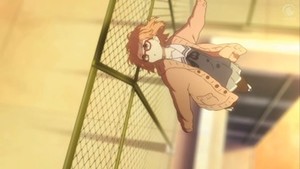
Beyond the Boundary
Rating: 4.5
Review: What do you get when the incomparable animators at Kyoto Animation decide to go swimming in the genrefied waters of supernatural action? You get Beyond the Boundary, a gorgeous, sometimes disconcerting combination of dark intrigue, athletic violence, and brain-curdling cuteness that is nonetheless sublimely entertaining. At a normal high school on a normal day, apparently normal high-schooler Kanbara spots a girl perched on the edge of the school roof. Though not usually the rescuing type, he rushes to help her—in part because she's rocking an awesome set of spectacles and Kanbara is a bon-a-fide glasses fetishist. The girl, Mirai, thanks him by running him through with a sword. He lives because, as it turns out, he's not in the least normal. Kanbara is half human but also half spirit-beast. He's immortal and unkillable. After her first failure, Mirai tries daily to kill Kanbara. Weirdly, the two develop something like a friendship as Kanbara, with the help of a lot of free food, gets Mirai to open up about her complicated circumstances.
The power of Kyoto Animation's genius for motion is not to be underestimated. From any base description of its premise, Boundary sounds pretty damned generic. And yet, under the auspices of Kyoto, it somehow ends up overflowing with personality: bursting with energy, crammed with vivid characters, awash in intriguing details and beautiful action. As she is animated, Mirai in particular is hugely winning: adorably clumsy, totally transparent, and thoroughly lethal. Her rapport with Kanbara is cuter than a puppy musical, and stands in nice contrast to the obviously dark forces swirling around them. Of course not everything comes down to animation prowess—the series has a wily genre film's knack for deflecting clichés just enough to keep them charming, as well as a briskly offbeat pace and a healthy respect for our intelligence—but its appeal is very much tied up in the joy of watching talented animators indulge their talents. Talents that inject thrilling life into a world, and its characters, that might not otherwise have had it.
Beyond the Boundary is available streaming at Crunchyroll.

Coppelion
Rating: 3.5
Review: A post-apocalyptic adventure of considerable beauty and, for now, very little action, Coppelion throws three genetically-engineered girls into the decaying remains of a disaster-ravaged Tokyo, where they find… nothing. The three girls are Ibara, Aoi, and Taeko. Ibara is the leader, a no-nonsense type with a strong sense of responsibility and an appropriately leader-like disregard for orders. Aoi is energetic and outgoing, with an as-yet-undefined role on the team. Taeko is quiet and has a great fondness for animals, with whom she shares her greatly enhanced senses. The three literally walk into the crumbling husk that was once Japan's capital, sent in by their Vice Principal (who is also a high-ranking military officer) to find and rescue any possible survivors. Tokyo was destroyed in a mysterious disaster that left it blanketed in a poisonous miasma that brings painful and inevitable death to normal humans. The girls are not normal. Engineered to be extremely resistant to the miasma, they can explore freely.
And explore they do, though they don't discover much of anything. They rescue a dying man in a hazmat suit, spot a dog and later fend off a wolf, but mostly they just wander through the silent Tokyo wasteland. Clearly the show isn't looking to thrill right off the bat. Rather, it's all about the ambience. Which, luckily, is amazing. The series’ future Tokyo is gorgeously illustrated and eerily empty, a maze of crumbling structures slowly being reclaimed by nature: leaning skyscrapers dripping moss and vines, cracked roads invaded by grass and weeds. It is simultaneously beautiful and threatening, haunting and beguiling. It is a metropolis transformed into a vast and unexplored wilderness. It's that wilderness, and the mysteries and adventures that it may hide, that will keep us coming back. Unfortunately the same cannot be said for the girls, who though cute and suitably complicated, are also annoyingly extreme in their personalities and behavior. Which doesn't bode well for the show's dramatic potential. Still, the premise and the setting hold enough promise to make that a bit of a moot point. For now.
discuss this in the forum (602 posts) |
this article has been modified since it was originally posted; see change history
back to The Fall 2013 Anime Preview Guide
Season Preview Guide homepage / archives